- Home
- Scott Westerfeld
Afterworlds Page 6
Afterworlds Read online
Page 6
“He’s tough to handle when he’s freaked out. And you’ve taken care of him enough for one lifetime.”
She turned her head and stared at me. I’d never said anything like that to her before, even though it was totally true.
When her eyes started to glisten, I pointed ahead. “Um, Mom? Road?”
Her attention went back to the highway. “He called this morning. But I was kind of bitchy and wouldn’t let him talk to you, since he wasn’t flying down. Sorry.”
“That’s okay.” I smiled. “He can call me when he buys me a new phone.”
I don’t know how late we drove that night. I fell asleep just as the sun was setting, the sky turning red and swollen overhead.
We were at a motel when the car stopped next, and I woke up just enough to stumble to our room. I remember that the bed smelled wrong—not bad, but wrong, because it wasn’t mine and I wanted to be home. And then I was asleep again.
* * *
It was still dark when my brain switched back on, all at once.
There was an energy running through my body. Not the panic I’d felt at every sudden noise for the last two days, but something dark and warm. My fingers went to my lips, which were buzzing.
I sat up and looked around the room, taking a moment to remember where I was. Light from the ice machine outside was creeping around the blackout shades, revealing my mother asleep on the other bed. The darkness felt close, like something physical pushing in on me.
I’d fallen into bed in dirty clothes, but on the dresser were the T-shirts and underwear we’d bought at the hospital gift shop. I took a shower, which didn’t wake Mom up, and dressed quietly. The hospital shop hadn’t sold socks, so I slipped my sneakers over bare feet, grabbed my hoodie, and went outside.
The sky was streaked with shredded clouds, slowly turning burnt orange as dawn approached. A few spots of broken glass in the motel parking lot glittered like frost in the still, cold air. I pulled on my hoodie and crossed my arms against the chill.
A neon sign read WHITE SANDS MOTEL, and across the highway loomed the silhouettes of sand dunes. We’d made it all the way to New Mexico.
My father had taken me to White Sands for a camping trip when I was ten or so. I wondered if Mom even remembered that I’d been here before.
With no cars in sight, I strolled across the empty highway, brazenly stopping in the middle to close my eyes and listen. The warm energy that had awakened me was still playing on my lips. In the silence I could almost hear it crackle.
When I opened my eyes again the desert looked as blank as fresh paper. White Sands is a desert like little kids draw, the dunes featureless humps receding into the distance. The scrubby deserts of California had looked wrong to me ever since that camping trip with Dad.
The dunes were low by the highway, but after half an hour of walking they’d grown high enough that I was climbing with hands and feet, shedding little avalanches with every step.
From the dune tops, the desert lay spread out before me, ripples in a vast white sheet. The sky had lightened, erasing all but a few stars, and the eastern horizon was blossoming with dawn. Down among the dunes were metal picnic tables bolted to blocks of concrete. Forty-foot poles shot up from them, little plastic flags at their tips.
I remembered those flagpoles from our camping trip. They were to help picnickers find their way back to the tables. The sands were so featureless that you could get lost a hundred yards from your picnic and wander straight out into the desert, thinking that your table was just over the next dune, or maybe the next. . . .
I wondered if there were any ghosts out there, tourists who’d gotten lost in the desert.
That’s when I felt it strengthen, the energy that had awakened me, a tingle on my lips and a heat in my veins. And I recalled something that Yamaraj had said . . . Believing is dangerous.
But I didn’t have a choice in what I believed. I wasn’t going to forget what had happened in Dallas. I’d seen firsthand what philosophers had been arguing about forever, that there was something after death. Whether it was good or bad, I didn’t know, but at that moment the metaphysical issues didn’t seem as important as one simple question:
Could I do it again?
Not only because it was something amazing, going to the land of the dead. But because Yamaraj had thrown me a challenge, saying that if I called him, he’d be there.
Did I believe in him enough to see him again? Did I believe in the afterworld at all?
I climbed the highest dune in sight and stood there, letting my breathing slow. I closed my eyes, focusing on the cold place that lived inside me now, my souvenir from the other side.
Was there some spell that could take me across? The first thing to try was obvious. . . .
“I’m dead.” A shiver went through me as I spoke the words, but when I opened my eyes nothing had changed out in the desert. Of course, I wasn’t lying in a pool of my own blood, with bullets whizzing overhead and panic in my veins. Plus, I was wearing a T-shirt with a picture of a stuffed bear holding a box of chocolates. (That’s hospital gift shops for you.)
I closed my eyes again, letting myself remember the details I’d spent the last two days shutting out—the cold terror of running for my life, the squeak of tennis shoes on tile. And then, out of nowhere, gun smoke stung my nostrils, and a shudder went through my body. My heart beat harder, but I kept my breathing slow.
“I’m dead.”
As the words came out, I imagined myself sliding down into the cool sand beneath my feet, down into darkness, through ink black and cold. It seemed like a long time later that I opened my eyes again.
But nothing had changed, except that dawn was a little brighter in the sky.
I sat down in the sand. This might be pointless, trying to think my way into the afterworld again. Maybe nothing short of a full-fledged terrorist attack would work. It wasn’t magic words that had changed me that day, but an unlucky plane reservation, seeing people die, a call to 911.
With a little shiver, I remembered the woman’s voice coming from my phone. She’d been so calm, almost mesmerizing in all that chaos. In a way, that had been the moment when I’d started to leave the real world behind.
For a third time, I closed my eyes and waited for quiet to settle over me. Then I said the words burned into my mind that day. . . .
“Security is responding.”
A shudder went through the sand beneath me, but I didn’t startle. I calmly breathed in the smell of gun smoke, and let the squeak of running shoes on tile pass over me. The tear-shaped scar on my cheek began to pulse.
I knew what to say next: “Can you get to a safe location?”
The changes came fast—the flat and metallic taste in the air, the silence of the wind, the sudden cold wrapped around my heart.
When I opened my eyes again, color had been sucked out of the world. The sky was huge overhead, as gray as polished gunmetal. There was no sun, only a scattering of red stars, like eyes peering down. Flowing rivers of black oil snaked among the dunes, the air above them wavering with heat. A sugary smell washed over me, sweeter than boiling maple syrup. The dark rivers below were rippling and shivering like a live thing, and my hands and arms were shining.
“Yamaraj,” I whispered. It was the first time I’d said his name out loud, but it felt natural in my mouth. Like a word from a language I’d learned a long time ago and only half forgotten.
A shiver went through me, and my grip on this gray place slipped a little. Back in the airport, panic had almost thrown me out. But this time it was excitement, a current that ran along my skin.
I closed my eyes again, shutting out the huge gray sky. I wasn’t sure what I was waiting for, but then another shift passed through the air. The scents of blood and gun smoke changed to something sharper, like a burning field of black pepper. And then a wave of heat . . .
“Elizabeth,” came his voice, and the cold inside me began to fade a little.
I opened my eyes and
Yamaraj stood there, halfway up the dune, a dark figure against the white sand.
I didn’t know what to say at first. “Hello” seemed insufficient, ridiculous.
“It worked, didn’t it?” I managed. “This is real.”
He took a long, careful look at me, until a smile crossed his lips. “Very real, Lizzie.”
Him saying my nickname—my real name—made the edges of my vision pulse again with color, as if the daylight world were trying to break through.
Yamaraj was as beautiful as I remembered. He still shone, as if lit by the missing sun. He climbed the dune and knelt a few steps from where I sat.
“I’m impressed.” His voice was soft, serious.
“What do you mean?”
He spread his hands at the desert around us, the gray sky. “You crossed over on your own. You called me, and so soon.”
I shrugged, trying to look casual. But at my sides, my palms had closed around cool fistfuls of sand. “You said I could.”
“I said it would be better not to believe, Lizzie. Safer too.”
“It’s not like I had a choice.” With Yamaraj this close to me, the sharp, cold place inside had softened, and the words came easier. “There was a ghost in the hospital, a little boy. Which means I can see spirits now. Did you know that was going to happen to me?”
“I knew it might, but . . . How did you know it was a boy?”
I blinked. The question made no sense. “Um, because he just was?”
“You could see him that well?”
“Sure. I didn’t even know he was dead at first. He just looked like . . . a kid. He said his name was Tom.”
Yamaraj sat a little straighter, as if I were suddenly something dangerous.
“What’s the matter?” I asked.
“It never happens this fast. At first, you should only see wisps of light, or hear stray noises. You talked to him?”
I’d been so proud of myself for crossing over to the afterworld, for calling Yamaraj. But now it felt like I’d done something wrong.
I tried to smile. “Quick learner. That’s what my Spanish teacher always says.”
“This is serious, Lizzie.”
“I know that.” My mouth went dry, the taste of anger sudden and bitter. “Did you think I missed the serious part of watching eighty-seven people die?”
“No,” he said simply, looking away across the desert. “But I hoped you’d forget. The changes fade, like scars, if you don’t believe.”
I took a few slow breaths. I wasn’t angry at Yamaraj, but at the four men who’d broken my reality. “That’s not going to happen. If I curl up and pretend none of this is real, then I’ll always be scared. Because I’ll still know.”
“I see,” Yamaraj said, still watching me carefully. “Then you’re going to become one of us, and very soon.”
I stared back at him, my skin restless and tight. The numbness I’d felt since the attack was melting, like when you put your ice-cold hands under running hot water, and the cold turns into itches and sparks.
“What the hell are we?” I looked down at the glimmer that lay on my pale hands, a fainter version of Yamaraj’s shine.
“There are many words,” he said. “Soul guides. Reapers. Psychopomps.”
I looked up. “Um, did you just say ‘psychopomps’?”
“Some names are more graceful than others. I don’t like ‘reaper,’ myself.”
“Too grim?” I asked.
As he smiled, I noticed that his eyebrows had a natural arch in them, a crook in their curve. It made him look like he was teasing me, despite the topic of conversation.
“You can give yourself any name you want,” he said. “What matters is, when we’re brushed by death, we change. Some of us can see the dead and walk among them. Some of us even live in the underworld. But most of us take longer than a few days to see ghosts clearly.”
I didn’t know what to say. I had seen Tom only hours after the attack.
“Unless . . .” He paused. “Has anything like this ever happened to you before?”
“Are you serious? Not a chance. But you said guides. So where did your sister take all those people?”
“To our home.” Yamaraj looked down at the rivers of black oil that coursed among the dunes. “Down to the underworld, where they’ll be safe.”
“Safe from what? They’re dead.”
He hesitated, then said softly, “There are predators.”
The last word sent a trickle down my spine. Suddenly this all felt vast and paralyzing, like realizing for the first time that death was real, and scarier and more complicated than I’d ever imagined.
Yamaraj leaned closer. “You’ll be okay, Lizzie. I can help you understand.”
“Thank you.” I reached out to take his hand.
At the spark of our fingers brushing, something went through my body, an ache, a longing. My heart beat sideways, and sudden colors wheeled across the sky, cutting the gray into tatters. For a moment I was back in reality, the rivers of black oil and red stars gone, like ghosts chased away by morning.
I pulled my hand away from him, and the gray world all came rushing back.
“Maybe this is too soon.” He looked down at his own fingers, which had sent that surge through me. “I should go.”
I swallowed, trying to speak. I wanted him to stay and tell me everything, but I also felt defenseless before all these changes—like the scar on my cheek, I was raw and new.
In the end all I could do was nod, and a moment later I was sitting alone on that tall sand dune, gasping fresh air, the sunrise pink and brilliant and warm on my skin.
“Shit a brick,” I said, staring at my hand. One touch had been enough to throw me back into reality.
My fingers went to my lips, and I sat there for a while, feeling alive for the first time in two days. Only a little piece of the afterworld’s cold remained, like a sliver of ice on my tongue.
* * *
My mother was stirring by the time I made it back to the room. My shoes and hair were full of sand, and sweat slicked my back inside my hoodie. But a shower could wait.
“Breakfast?” I asked as her eyes opened.
Mom nodded. “You must be starving. You hardly ate yesterday.”
She got up and ran a brush through her hair, and a minute later we were headed toward the motel diner. As we crossed the parking lot, an eighteen-wheeler rolled to a stop in one of the truck-sized spaces. I could feel its rumble through my feet and the heat of its engine against my skin, as if it were a monster beside us.
“You look kind of spacey,” my mother said.
“Not enough sleep.” Then I did the math. “Make that too much sleep.”
“Poor kiddo,” she said softly.
We went inside and studied the place mat menus, Mom smiling at how much I ordered. My body was really waking up now, wanting food and coffee and for the world to make sense again.
After the waitress had left us, I caught my mother staring at the stitches on my forehead. Then her eyes lingered on the place where the single tear I’d cried in the afterworld had left a tear gas burn on my left cheek.
I doubted she knew how often she did that. Would she keep doing it for the rest of her life?
But finally she turned from me to look out the window. “It’s so beautiful here. We should stop and see some of the sights.”
“Um, like the sand dunes?”
“Well, they’re kind of hard to miss. But there’s a ghost town up north of here. It’s called Chloride, because of a mining boom way back. There was a brochure in the room. Looked interesting.”
For a moment I thought of Tom’s face, and a shudder went through me. “No ghost towns, okay?”
She turned back from the window and saw my expression, then reached to take my hand.
“Of course not.” She was talking just above a whisper, like she didn’t want anyone else to hear. “Sorry I even mentioned that.”
“No, I’m fine, Mom. It’s just that . . .
” These terrorists had tried to kill me but I’d gone to the land of the dead and now could see ghosts and apparently had acquired dangerous new powers and this boy, this boy had touched my fingertips—and they still tingled.
Plus, I really needed some better clothes.
“It’s okay,” my mother said. “We’ll just get you home.”
CHAPTER 9
AN HOUR LATER SOME TWO dozen authors had arrived. YA Drinks Night had taken over several tables, though these were populated only by handbags and empty glasses, as everyone was standing now.
Oscar had introduced Darcy around, as a writer whose debut novel featured a hot Vedic death god. Everyone smiled when they heard that phrase, or joked that they were dying to read it. Somehow reducing her book to a single phrase made talking about it less paralyzing. It gave Darcy a feeling of control, like knowing Rumpelstiltskin’s name.
Everyone was talking about their own work as well, and about the superpowers of their agents, the bloody-mindedness of copyeditors, and the perfidies of marketing departments. Darcy was swimming in a sea of publication, and all she wanted was to drown.
My first day in New York, she thought, a little giddy from her second Guinness.
“Are you Darcy Patel?” asked a young woman in a bright red fifties cocktail dress. “You signed with Paradox a couple of months ago, right?”
Darcy smiled. “That’s me. Afterworlds.”
“Sister debs!” the woman cried, and gathered Darcy into a breath-stopping hug.
When she let go, Darcy stumbled back a step. “Um, sorry?”
“I’m Class of Fourteen too! We’re sister debs!”
“Right.” Darcy wasn’t sure if “deb” was short for “debutante” or “debut author,” but they meant the same thing. “It’s nice to meet you.”
“I’m Annie Barber. Pretty stupid, right? I should have gone with a pen name.” She looked fearful, as if Darcy were going to revoke her publishing deal on the spot.
“I’ve always liked the name Annie,” Darcy said.
“Yeah, but ‘Barber’ sounds like . . . a barber. But at least I’m at the beginning of the alphabet, so I’ll get shelved at eye level. I’ve heard the end is okay too, because some people sit down and start at the end. It’s just the middle letters that everyone ignores.”

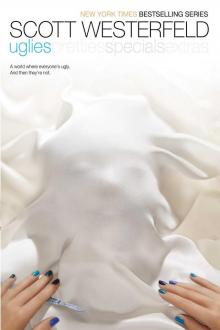 Uglies
Uglies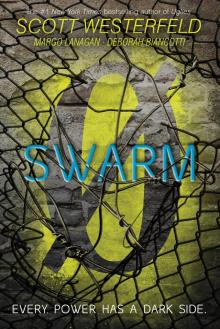 Swarm
Swarm Pretties
Pretties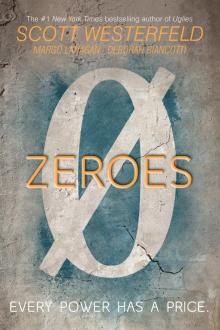 Zeroes
Zeroes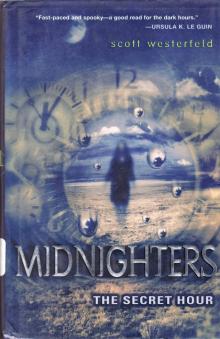 The Secret Hour
The Secret Hour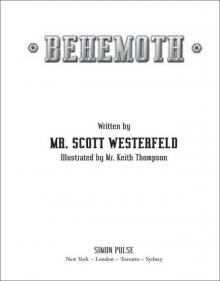 Behemoth
Behemoth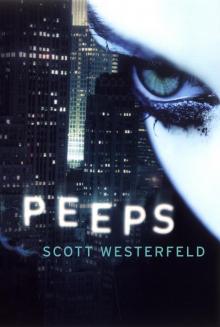 Peeps
Peeps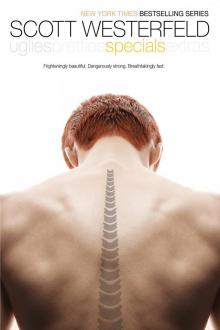 Specials
Specials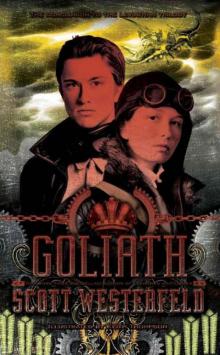 Goliath
Goliath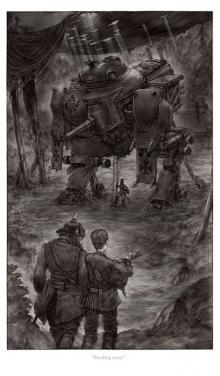 Leviathan
Leviathan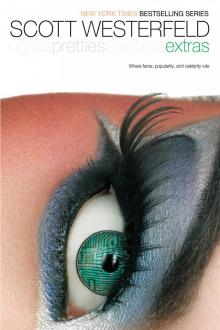 Extras
Extras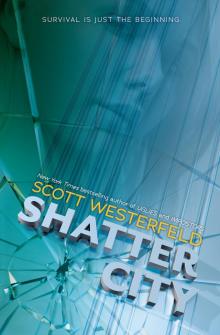 Shatter City
Shatter City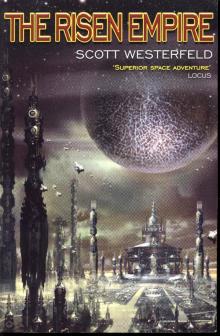 The Risen Empire
The Risen Empire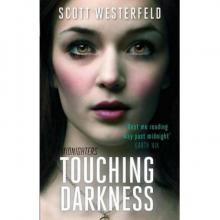 Touching Darkness
Touching Darkness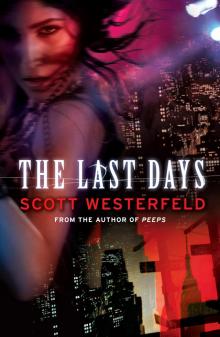 The Last Days
The Last Days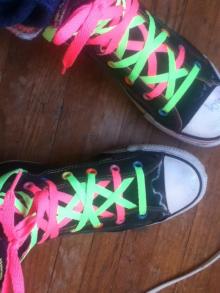 So Yesterday
So Yesterday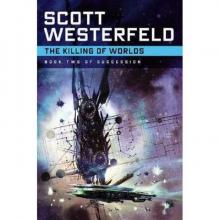 The Killing of Worlds
The Killing of Worlds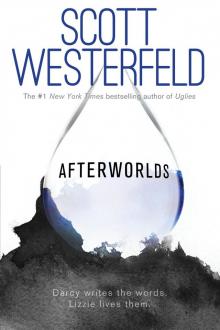 Afterworlds
Afterworlds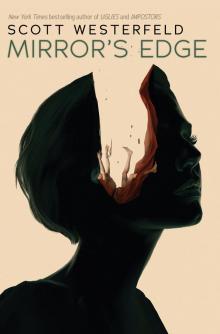 Mirror's Edge
Mirror's Edge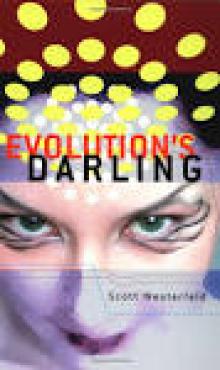 Evolution's Darling
Evolution's Darling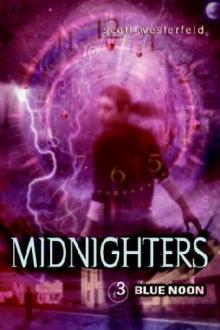 Blue Noon m-3
Blue Noon m-3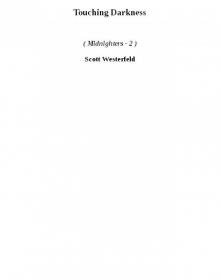 Touching Darkness m-2
Touching Darkness m-2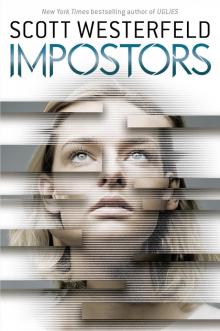 Impostors
Impostors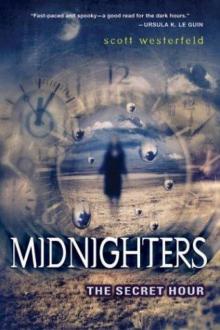 The Secret Hour m-1
The Secret Hour m-1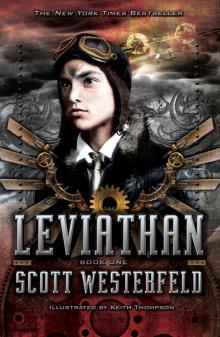 Leviathan 01 - Leviathan
Leviathan 01 - Leviathan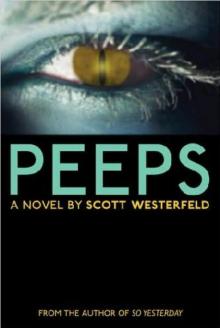 Peeps p-1
Peeps p-1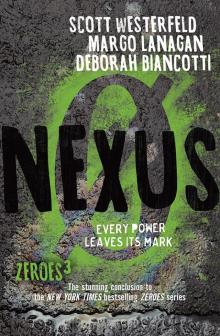 Nexus
Nexus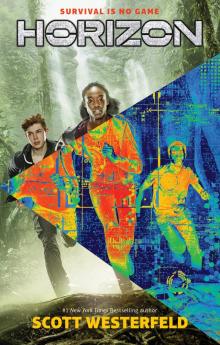 Horizon
Horizon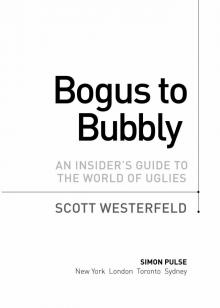 Bogus to Bubbly
Bogus to Bubbly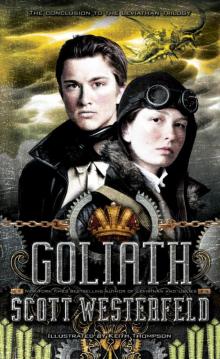 Goliath l-3
Goliath l-3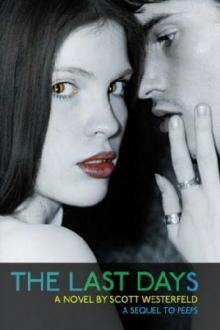 The Last Days p-2
The Last Days p-2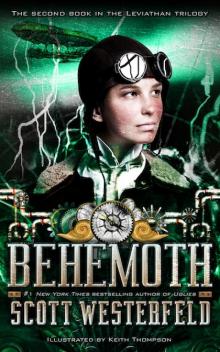 Behemoth l-2
Behemoth l-2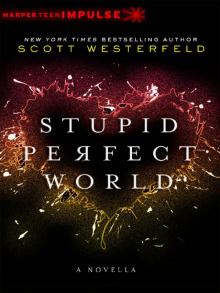 Stupid Perfect World
Stupid Perfect World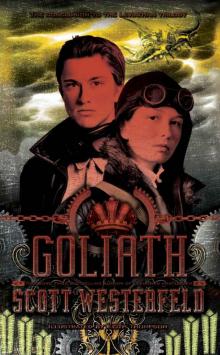 Goliath (Leviathan Trilogy)
Goliath (Leviathan Trilogy)